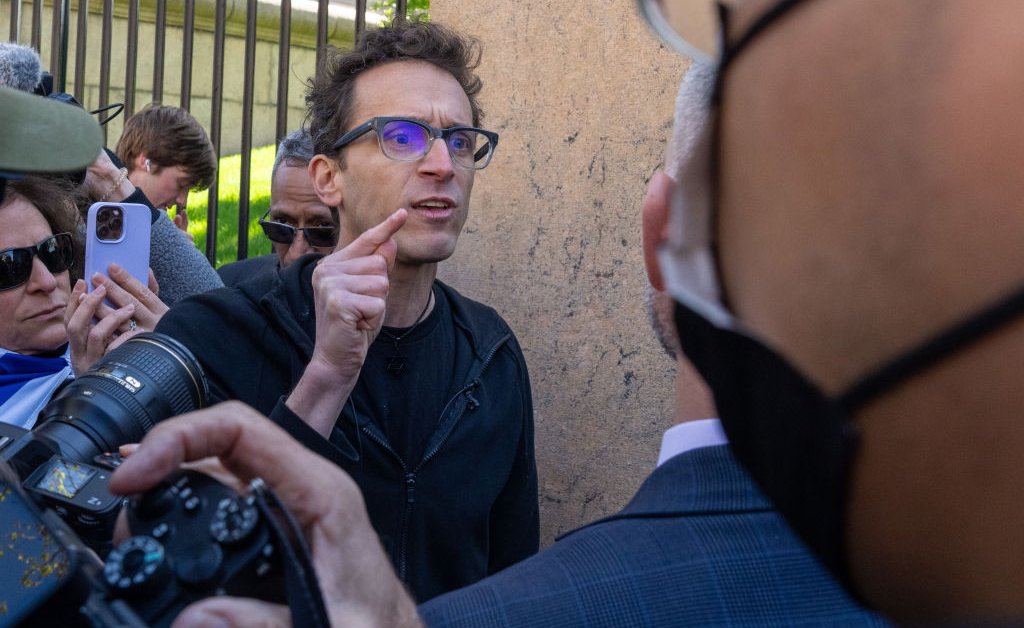Israel’s war in Gaza has roiled college campuses across America, as students have set up encampments and rallied against Israel’s military campaign in Gaza, sparking free speech debates and creating sharp divisions with members of government, alumni, donors, other students, and some faculty amid accusations of antisemitism.
Emerging as one of the most prominent and controversial figureheads of the opposition to pro-Palestinian protesters is Columbia Business School assistant professor Shai Davidai, who is Jewish and Israeli American and has recently found himself barred from parts of Columbia’s New York campus amid the latest flareup in tensions.
Davidai, who joined Columbia Business School in 2019, went viral in October for a speech criticizing the president of Columbia University for not speaking out against “pro-terror student organizations” in the wake of the Oct. 7 attack on Israel. He’s become the focus of attention again this week, particularly since he wrote in a post on X that Columbia “refused to let me onto campus” on Monday morning “because they cannot protect my safety as a Jewish professor.” In a video circulating on social media of Davidai, he was told by school officials that his ID had been deactivated. As Davidai demanded to enter, a crowd around him chanted “let him in.”
Davidai had planned to stage a sit-in on the lawn where the pro-Palestinian encampment is located. Ahead of his appearance on campus on Monday morning, Davidai posted an email exchange of his negotiation with university chief operating officer Cas Holloway. Holloway told Davidai that he could hold his “counterprotest” on the Math Lawn, where public safety officers would be present. In response, Davidai wrote that he was “exercising my right as a Jewish professor to stand in a public space on campus.”
In another email cited by outlets including the National Review, Holloway told Davidai around 8:34 a.m. on Monday that he was not permitted to enter the West Lawn due to safety risks, and would instead be required to hold his event on the Math Lawn, which was established as a “counterprotest area” according to the school’s “standard operating procedure.”
“As a faculty member, you have a fiduciary duty to do everything in your power to help keep our students and campus safe,” Holloway wrote.
While Davidai was still barred from the gates, he urged those who had Columbia University IDs to enter the encampment. Meanwhile, neon-vested people—mostly faculty members who were trained in de-escalation techniques—were stationed around the encampment, and protesters lined up to block the entrance in anticipation of Davidai and his supporters, the student newspaper Columbia Daily Spectator reported.
When asked about the recent incident, Davidai referred TIME to his comments on his social media accounts. Davidai, who describes himself as Zionist in his bio on X and has said he was “proud” to serve in the IDF, has been a vocal critic of the school’s management of simmering tensions between pro-Palestinian protesters and those on the other side, including himself, who have been accusing the protesters of antisemitism. He’s also been the subject of much criticism for what some say is behavior that only riles up the tensions.
“Shai acts like a 12 year old in need of attention, desperately staging viral videos and demanding retweets at the direct expense of the community for which he’s got a caretaking responsibility,” Lee Kovarsky, a law professor at the University of Texas, said in a thread on X criticizing Davidai that has been seen more than 3 million times since it was posted on Monday, according to X.
Some allege that Davidai has crossed boundaries and endangered student safety. Several students told the Columbia Daily Spectator that they had received threats after being “targeted” by Davidai on social media. Davidai told the newspaper that he was being investigated by the Office of Equal Opportunity and Affirmative Action, and he wrote on X in March that the internal investigation was “a clear act of retaliation and an attempt to silence” him for his advocacy.
A petition started in March by advocacy group We Are Tov calling for the university to support Davidai and drop its investigation has garnered over 32,000 signatures, while a counter petition started earlier this month by Columbia Students for Justice in Palestine, calling on the university to fire Davidai, has garnered over 11,000 signatures.
Davidai’s run-in with Columbia authorities on Monday triggered responses from politicians, including Rep. Jared Moskowitz, who, in support of Davidai, likened the episode to “tactics of the Nazis.”
“We’ve seen this before. When Jews were told not to go places, when people stood together barring them into buildings,” Moskowitz told reporters on Monday.
The tensions at Columbia show no sign of easing. The school is facing lawsuits filed by students on both sides, as well as a U.S. House probe about antisemitism on campus. Over 100 pro-Palestinian protesters were arrested by New York police last week, while a rabbi linked to the school has urged Jewish students to stay home for their safety. School authorities announced on Monday that all classes on its main Morningside campus will take a hybrid format until the end of the semester.



